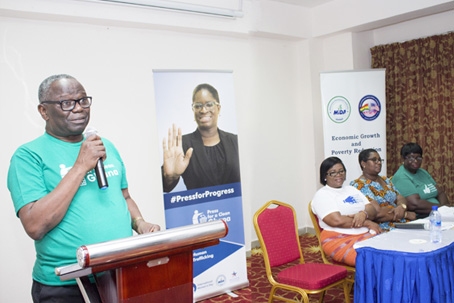 procurement opportunities
procurement opportunities
 documents and reports
documents and reports
GENDER INEQUALITY IS A CONSTRAINT TO ECONOMIC GROWTH - MiDA CEO

Mr Martin Eson-Benjamin, the CEO of the Millennium Development Authority, has said gender inequality is a constraint to economic growth and urged the media to educate the citizenry on gender equality to change their perception about women.
He said women had made strides in exercising their rights, but there was the need to make extra effort to entrench those rights.
“Some of the women are still engulfed in primitive traditions, which inhibit them from achieving their full potentials,” he said.
Mr Eson-Benjamin made the call at the launch of the Gender and Energy Working Group (GEWG) in Accra on Thursday, which was constituted by the Millennium Development Authority (MiDA).
The GEWG was established in May 2017 by MiDA to support the implementation of the Ghana Compact.
The GEWG comprised gender and energy experts drawn from agencies and government organisations, who would press for change in the country’s power sector.
The members would implement Social and Gender Integration Plan (SGIP) under the Ghana Compact, monitor and review activities of the SGIP, undertake capacity building for the focal persons and female employees associations of the Electricity Company of Ghana and Northern Electricity Distribution Company.
The inauguration coincided with the celebration of the International Women’s Day, with the global theme: “Time is Now: Rural and Urban Activists Transforming Women’s Lives,” while Ghana adopted: “Women Too: Press for Progress as Game Changers to develop Ghana” as its local theme.
Mr Eson-Benjamin said the power compact was intended to reduce poverty through economic growth in the country, recognising that gender inequality was a constraint.
Therefore, he said, gender and social inclusion was a major requirement in the design and implementation of various projects within the Ghana Compact.
The Compact required MiDA to develop a Social and Gender Integration Plan, which would ensure their systematic inclusion.
“There is a lot of efforts being made to ensure that women play a role in the energy sector. If a lot of people all over the world have gathered in various places to commemorate International Women’s Day, it should tell us that women play key role in the progress of the society,” he noted.
“Ghana’s population have more women than men, therefore if our women are science driven, the chances of our economy growing rapidly is high.
“For many reasons, the intervention of energy makes a woman a happier person, energy is very important to women because a lot of things they do at home require power and energy, and it makes life easier,” he said.
Mr Eson-Benjamin, therefore, encouraged all and sundry to be ambassadors for women by creating awareness and the need to put women at the forefront.
With regards to sanitation and environmental cleanliness, Mr Eson-Benjamin stressed the need for women to keep the market neat because most of them sell in the markets compared to their male counterpart, saying; “Just as they would keep their homes clean they should also try and brighten their corners at the market”.
Dr Mrs Cherub Antwi-Nsiah, the Director of Gender and Social Inclusion at the MiDA, said the Working Group was expected to steer and support the implementation of the SGIP and facilitate efforts of women to access energy for their work, as well as ensure the welfare of the citizens.
She said the implementation of the SGIP would enable more women to participate in the energy sector, enhance employment opportunities for them in the power sector, which would improve their earnings among other things.
Mr Antwi-Nsiah said the successful implementation of the programme would ultimately ensure economic empowerment of women, reduction in violence against women, reliable delivery of electricity to traders, market women and other artisans, which would result in poverty alleviation.
“There would be greater recognition of women’s contribution to the energy sector and ultimately, all of these outcomes would contribute to reducing poverty in Ghana,” she stated.
Source: GNA
Newsletter
- 2nd December, 2019MiDA Newsletter, Vol 3 Issue 2
- 29th March, 2019MiDA Newsletter, Vol 3 Issue 1
- 30th September, 2018MiDA Newsletter, Vol 2 Issue 4
- 29th June, 2018MiDA Newsletter, Vol 2. Issue 3
- 30th March, 2018MiDA Newsletter, Vol. 2 Issue 2
- 29th December, 2017MiDA Newsletter, Vol. 2 Issue 1
- 30th June, 2017MiDA Newsletter, Vol.1 Issue 4
- 16th December, 2016MiDA Newsletter, Vol.1 Issue 3
- 30th June, 2016MiDA Newsletter, Vol.1 Issue 2
- 1st February, 2016MiDA Newsletter, Maiden Edition
Stakeholder Consultations
Workshops
- 22nd March, 2017MiDA/MCC PROCUREMENT GUIDELINES WORKSHOP HELD
- 9th September, 2015SECOND POLICY DECISION MAKERS WORKSHOP FOR PSP TRANSACTION IN ECG
- 1st January, 1970Development and Enforcement of Standards and Labels Activity
- 1st January, 1970Improved Energy Auditing Activity
- 1st January, 1970Education and Public Information Activity
- 1st January, 1970Demand Side Management Infrastructure Activity
 Outreach
Outreach
